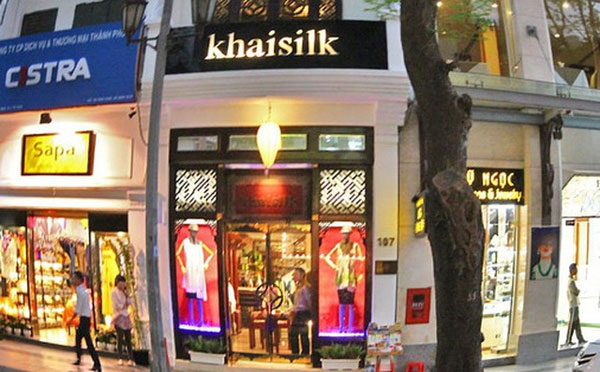VietNamNet Bridge – The town is agog with gossip and discussions about the KhaiSilk imbroglio, which has shocked the nation.

While it seems like a cut and dry case of cheating on the surface, its implications go much further. It hurts more people than the customers who paid a premium price for the brand.
The bare facts are as follows: On October 23, a customer bought 60 Khaisilk scarves worth VND644,000 (US$28) each, and found one of them having two labels, one made-in-Viet Nam and another made-in-China.
Two days later, Hoang Khai – the group chairman, apologised and admitted to online newspaper zing.vn that the scarves were actually imported from China. He said half the silk used by the group came from China, while the rest came from Vietnamese craft villages.
The latest news on the case is that the Ministry of Industry and Trade on Monday afternoon ordered its Market Management Department to send the case files to the Ha Noi Police Department for investigation. At present, all Khaisilk stores in Ha Noi and HCM City are closed.
There are many levels at which this fraud impacts people.
The obvious one is that the price of a Khaisilk scarf is several times higher than typical made-in-China item. People were willing to pay higher prices for the brand because it had built up a reputation for Vietnamese high-end, high quality products. That trust has vanished in a second.
Nguyen Lan Huong of Cau Giay District said she felt cheated and frustrated.
“I’ve bought many Khaisilk scarves as gifts for my foreign friends for years. I thought of them not only as made-in-Viet Nam scarves, but also as a luxurious, branded product designed and created by Vietnamese,” Huong said.
Dao Trung Hieu of Thanh Xuan District, said: “I don’t know how to explain to my foreign friends, those to whom I have given Khaisilk products as gifts.
Hieu said he used to be proud of the brand when he introduced it to his foreign friends earlier. He also told friends that Khai was a kind businessman with a dream to build a Vietnamese brand that wins regional and international recognition.
“But Khai has ruined my trust now,” he said.
Hieu said he remembered that Khai had once said that he did his business honestly.
“He is a liar,” Hieu said, adding: It’s so sad for the brand that had taken 28 years to build,” he said.
Authorities were not pleased either. Minister and Chairman of the Government Office, Mai Tien Dung, called it unacceptable behavior. Minister of Industry and Trade, Tran Tuan Anh, said that the case showed “signs of violating both regulations and business ethics.”
More than all this, when a well known, prestigious brand is caught cheating, the country suffers. At a time that the nation is focused on deepening its global integration, this is an inopportune scandal.
The higher you go, the harder you fall, they say. All Vietnamese businesses, not just famous brands, should draw a lesson from the Khaisilk scandal and avoid committing frauds that will hurt the entire community of entrepreneurs. There is a lot at stake here.
Many top brands have their products made in Viet Nam, but final buyers are fully aware of this, and it enhances the country’s reputation as one where workers have the ability to make world-class quality stuff.
When the reverse happens, it goes beyond hurting immediate customers. It has the potential to taint an industry, even a country.
Businesspeople should always remember that they are public citizens and ambassadors for their country, and their behaviour has to be above reproach, all the time.
Long-term consequences
In Viet Nam, ten years ago, a well-known domestic company specialising in manufacturing locks was also caught in a similar situation. Customers believed they were buying quality made-in-Viet Nam locks, till market watchdogs found it was importing them from China and selling it in domestic market with its own label. After the case, the company’s business activities met troubles and seemed to be unprofitable until 2015. The company survived by profiting from real estate transactions, but their locks vanished into obscurity after more than 30 years.
In the world at large, car marker Volkswagen said recently that it would be hit with an additional charge of $2.9 billion for its “dieselgate” scandal in 2015. The total damage that the firm has suffered from the scandal is estimated at EUR 25 billion ($29 billion).
Khaisilk might also have to face similar consequences, apart from the loss of reputation and customers’ trust. Its founder has actually said that investment in other sectors, yes real estate again, had diluted focus on what used to be the group’s main business. That is no excuse when you are a prestigious brand commanding premium market prices.
As they say: “A liar will not be believed, even when he speaks the truth.”
By Nguyen Hang
Source: VNS